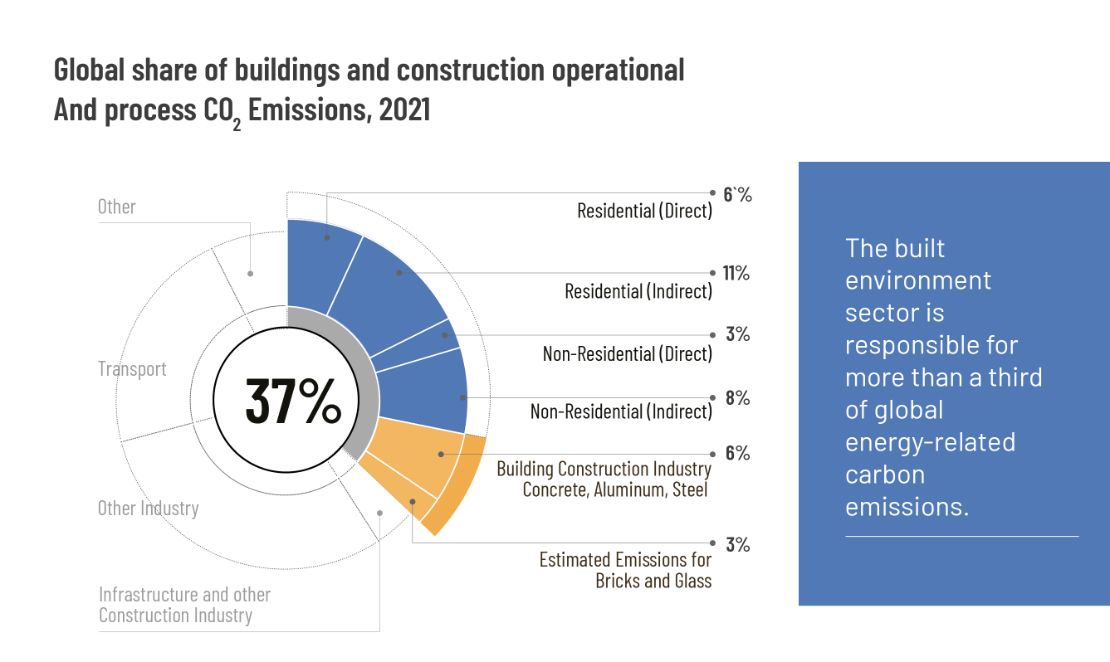
INSIGHT Jun 07, 2024
Reducing The Environmental Footprint Of Construction: Transformative Potential Of Sustainable Building Practices
The construction sector stands as a significant contributor to the global environmental footprint, marked by substantial energy use, resource consumption, and waste generation. As the world grapples with the urgent need for sustainability, the spotlight turns to the construction industry's capacity for transformation.
This comprehensive exploration delves into the environmental footprint of construction and the pioneering potential of sustainable building practices.
The construction industry's environmental impact is multifaceted, encompassing the entire lifecycle of buildings and infrastructure. Key aspects include:
Resource Consumption: Construction demands vast quantities of materials, such as concrete, steel, and timber, contributing to resource depletion and habitat destruction.
- Energy Use: From the extraction and processing of raw materials to construction operations, the sector is energy-intensive, contributing significantly to carbon emissions.
- Waste Generation: Construction and demolition activities produce a large volume of waste, much of which ends up in landfills, exacerbating pollution and landfill space issues.
- Water Use and Pollution: Construction projects often require substantial water resources, while runoff from sites can pollute waterways with sediments and chemicals.
Sustainable construction practices offer a pathway to reducing the industry's environmental footprint while aligning with broader sustainability goals. These practices encompass a wide range of strategies, from design to demolition:
ADVANCED BUILDING MATERIALS:
Innovative materials are at the forefront of sustainable construction. Developments in green concrete, recycled steel, and bio-based materials reduce resource extraction and offer lower-carbon alternatives. Additionally, the use of modular and prefabricated components can minimize waste and improve construction efficiency.
RENEWABLE ENERGY INTEGRATION:
Incorporating renewable energy sources, such as solar panels and wind turbines, directly into buildings reduces reliance on fossil fuels and lowers greenhouse gas emissions. This approach supports the transition towards a more sustainable energy system.
EFFICIENT WATER USE AND MANAGEMENT:
Sustainable construction practices also extend to water efficiency, utilizing rainwater harvesting systems, low-flow fixtures, and water-efficient landscaping to reduce consumption and mitigate runoff pollution.
WASTE REDUCTION AND RECYCLING:
Adopting a circular economy model in construction processes emphasizes reusing and recycling materials, significantly cutting down waste generation. Effective waste management strategies, such as on-site sorting and recycling, further contribute to environmental conservation.

CHALLENGES AND OPPORTUNITIES:
Transitioning to sustainable construction practices presents challenges, including higher upfront costs, market readiness, and the need for skilled labor. However, these obstacles also present opportunities for innovation, market transformation, and economic growth. Sustainable construction not only mitigates environmental impacts but can also lead to long-term cost savings, improved occupant health, and enhanced resilience to climate change.
THE ROLE OF POLICY AND REGULATION:
Effective policies and regulations are crucial in driving the adoption of sustainable construction practices. Building codes, green certifications, and incentives can encourage the industry to adopt higher sustainability standards, fostering a competitive market for green building solutions.
EMPHASIZING EDUCATION AND TRAINING:
The construction industry's journey toward sustainability is both necessary and achievable. By embracing sustainable building practices, the sector can significantly reduce its environmental footprint, contributing to global efforts to combat climate change and protect natural resources. This transformation requires the collective efforts of all stakeholders, from policymakers to practitioners, and a commitment to innovation and excellence in sustainable design and construction.
Conclusion: Building a Sustainable Future
The construction industry's journey toward sustainability is both necessary and achievable. By embracing sustainable building practices, the sector can significantly reduce its environmental footprint, contributing to global efforts to combat climate change and protect natural resources. This transformation requires the collective efforts of all stakeholders, from policymakers to practitioners, and a commitment to innovation and excellence in sustainable design and construction.
Through a blend of innovation, policy, and collective effort, the construction sector can pave the way toward a more sustainable and environmentally conscious future.
At ECOBUILD, we are dedicated to advancing sustainability in the construction industry. Our expertise in sustainable design, green building materials, and energy efficiency enables us to support projects in reducing their environmental footprint. With ECOBUILD, you can transform your construction practices, embracing sustainability to build not just for today, but for a more sustainable future.
